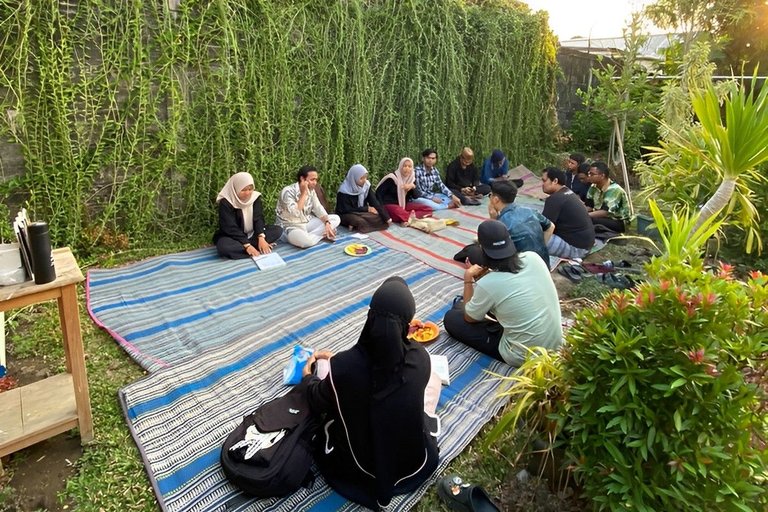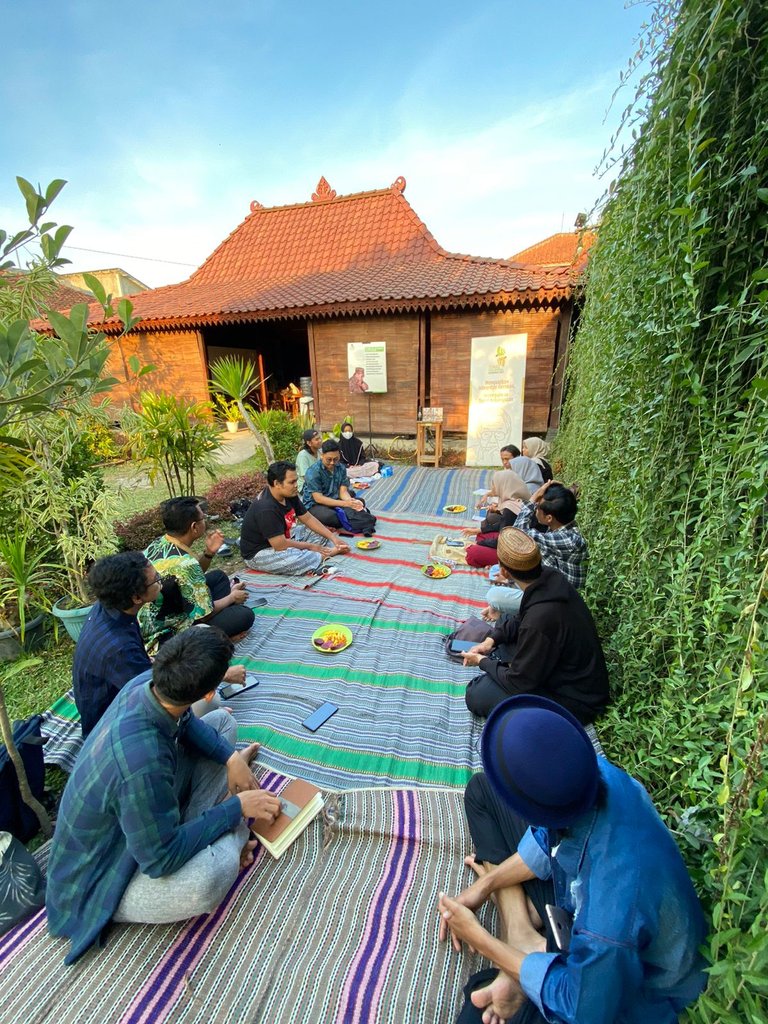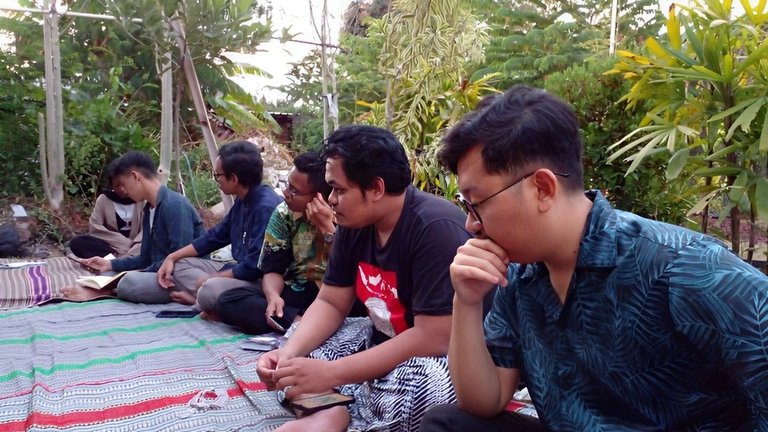I unlocked the newbie week of September with memorable efforts. Last Friday, September 8, 2023, I was honored to assist as the moderator for the particular book review of Ajaran-ajaran Gus Dur: syarah 9 nilai utama Gus Dur – Gus Dur's Code of Belief: syarah 9 core values of Gus Dur – authored by Nur Kholik Ridwan.
In this month's edition of cangkrukan (casual dialogue) at Griya Gusdurian, one of the values discussed was Tawheed (Monotheism), which was the foundation of Gus Dur's mindset and behavior.
At first, I had doubts, as my knowledge wasn't at the moderator level, and what's more, I wasn't a notable figure in the Jaringan Gusdurian, just a participant for a few moments.

The chat was quite interesting, as it wasn't just attended by Muslim believers of Gusdurian, but also included non-Muslims. There was even one participant from New York who was interning with the Gusdurian. It was amazing to see how this discussion brought together people from different parts of the world.
I was apprehensive about my role as the moderator, given my limited knowledge and ignorance of the concept of Tawheed. Although I had participated in several talks before, I had never taken on such a significant role like this.

For this reason, I sought the opinions of the conversation participants, and each person agreed that Tawheed shouldn't at most be spoken but also put into practice.
In line with what was the insight shared by Rivaldi Abdul, also known as Didi had to say. He quoted an article by Charles J. Adams titled Islamic Religious Tradition from the book The Study of the Middle East, edited by Leonard Binder. Adams's article highlighted the interconnectedness of inward experience (faith) and outward behavior (expression) within religious practice.
Faith is the breath of religious practice, and religious conduct itself is a manifestation of faith. There was a famous expression to clarify this statement from Gus Dur when he said, "My spiritual teacher is reality, and my reality teacher is spirituality."
The main idea in this discourse is the concept of Tawheed and its practical application in our social lives. Tawheed, the belief in the oneness of God, stands at the core of faith, with each religion having its own unique concepts of belief. In Islam, for example, we recognize Allah as the compassionate الرحمن (Ar Rahman) and the merciful الرحيم (Ar Rahiim).
Having said that, a profound concern issue that we discussed was the paradox of violence committed in the name of Allah, both physical and verbal. Countless people claim to believe in a compassionate God, but why could they not show compassion to their fellow human beings?
Some people claim to love a merciful Allah, but why do they find it difficult to show mercy to each other in everyday life, especially towards people of different religions?
While it may appear cliché, there was a more thought-provoking question posed by one of the Gusdurian drivers, Maria Al-Zahra. She asked, "Why do some individuals exploit divine verses for political gains, above all as we approach the 2024 presidential elections?"
Maria's question carries a deeper implication: Why do politicians suddenly adopt an outwardly pious and "Tawheed"– oriented persona as elections approach, it's no different from identity politics that could perchance deviate from the principles of Pancasila, all for political gain.
The forum became vigorous when Siti Muliana, the discussion catalyst, touched upon the topic of Gus Dur being a 'wali' – saint or a flawless prophet. Almost all disagreed with this notion, signifying that Gusdurians do not position Gus Dur as a holy man who is infallible.
In that case, Hamatsa Hafidzu mentioned Gus Dur as an inspiration, for he epitomized democracy in action. Gus Dur was a "democracy on the spot," meaning that Gus Dur was always willing to listen to the people and to make decisions based on their input. He was also a strong advocate for human rights and social justice.
Indeed, anyone could become a successor to Gus Dur by embracing and practicing his nine core values. These values - Tawheed, Humanity, Justice, Equality, Liberation, Simplicity, Brotherhood, Chivalry, and Traditional Wisdom - transcend religious and cultural boundaries.
Afterward, Dendy posed a question, asking, "Why were the nine values intentionally arranged in this order, starting with Tawheed and then followed by Humanity and so forth?"

Nur Solikin at that moment explained that the nine core values did not originate directly from Gus Dur himself. They were the result of a formulation process by Gusdurian learners, among them Solikin.
Ab initio, there were numerous values associated with Gus Dur, with evidence such as the ten honorary doctorate titles he received. In agreement with Solikin, there were around 38 values initially considered, which were then condensed into the final selection of nine core values.
"As a result, if we were to visualize it as a circle, Tawheed would be at the center point, and then in the subsequent layers, we would fill in the other values," Solikin responded to Dendy's poser.
With the understanding that we were to liken it to a teak tree, Tawheed could be compared to the roots (inward experience), analog to the concept of Charles J. Adams. Just as if the roots are diseased or dead, the teak tree could wither or fall, but if the roots are healthy, the teak tree will thrive (outward behavior). It could protect and shelter what lies beneath and around it.
Last but not least, I'm thankful for the chance to be part of this meaningful exchange of views. It has deepened my understanding of Gus Dur's core values and motivated me to keep learning and growing.
I appreciate each one who took part, and I encourage readers to share their feedback and experiences with Gus Dur if they know him. Wish me luck for being able to write more, at least the remaining eight core values.
This is a valuable right set of circumstances to learn from one another and exchange thoughts on an important topic that resonates with each and every one of us [mhg].